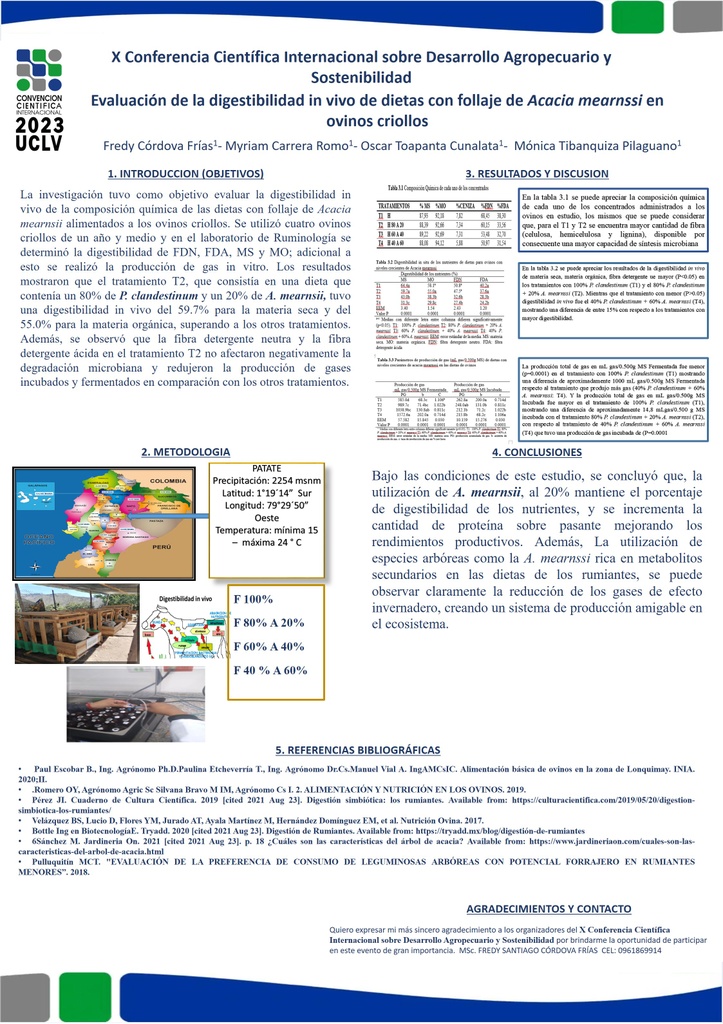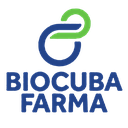Executive Secretary

9th International Scientific Conference on Agricultural Development and Sustainability
10th Symposium of Veterinary Medicine and Zootechnics

Abstract
The objective of the research was to evaluate the in vivo digestibility of the chemical composition of diets with Acacia mearnsii foliage fed to Creole sheep; the leaves of this shrubby plant were collected from Patate city; then subjected to a drying process to make a pelleted food for easy administration. Four Creole sheep of a year and a half were used, the same ones that were dewormed and vitaminized, they were placed in metabolic cages for a period of 68 days; 12 days of adaptation, and 5 of sampling. Subsequently, the respective analyzes were carried out in the Ruminology laboratory at the Technical University of Ambato, in which were determined the digestibility of FDN, FDA, MS, and MO; in addition, in vitro gas production was performed. The variables were analyzed using a one-way ANOVA, obtaining 59.7 % and 55.0 % of in vivo digestibility of dry matter, organic matter for T2 before the other treatments with and without the inclusion of acacia; while, for the same T2, neutral detergent fiber and acid detergent fiber do not affect microbial degradation and reduce the production of incubated and fermented gases from the evaluated treatments. Concluding that T2 (80% P. clandestinum + 20% A. mearnssi); and the addition of 20% condensed tannins maintain digestibility, reducing the production of greenhouse gases, and creating regenerative livestock.
Resumen
La investigación tuvo como objetivo evaluar la digestibilidad in vivo de la composición química de las dietas con follaje de Acacia mearnsii alimentados a los ovinos criollos; las hojas de esta planta arbustiva fueron recolectadas del cantón Patate; luego sometidos a un proceso de secado con la finalidad de realizar un alimento peletizado para su fácil administración. Se utilizó cuatro ovinos criollos de un año y medio, los mismos que fueron desparasitados y vitaminizados, estos se colocaron en jaulas metabólicas por un periodo de 68 días; de los cuales fueron 12 días de adaptación y 5 de toma de muestra. Posteriormente se realizaron los respectivos análisis en el laboratorio de Ruminología de la Universidad Técnica de Ambato, en las cuales se determinó la digestibilidad de FDN, FDA, MS y MO; adicional a esto se realizó la producción de gas in vitro. Las variables fueron analizadas mediante una ANOVA de una vía, obteniendo el 59,7 % y 55,0 % de digestibilidad in vivo de materia seca, materia orgánica para el T2 ante los demás tratamientos con la inclusión y sin la inclusión de acacia; mientras que, para el mismo T2 la fibra detergente neutro y fibra detergente ácida no afecta la degradación microbiana y reduce la producción de gases incubada y fermentada de los tratamientos evaluados. Concluyendo que el T2 (80% P. clandestinum + 20% A. mearnssi); y la adición de tanino condensados en un 20% mantiene la digestibilidad reduciendo la producción de gas de efecto invernadero creando una ganadería regenerativa.
About The Speaker

M. Sc. Fredy Santiago Córdova Frías

Discussion

